Last Updated on 25/03/2022
God created the universe from 5 principal deities, Brahma, Vishnu, Mahesh, Prajapati, and Minakshi. Each god has its own characteristics as well as the characteristics of god. Out of them, Lord Shiva is considered the supreme god. Shiva is mostly depicted as a peaceful deity who loves animals and meditation. He is also described as a fierce deity who when he takes up the form of Natraj or Bhairav. The deity is worshipped in the symbolic form of a Shivling throughout India. Numerous temples and pilgrimages are dedicated to him in the subcontinent. From Kashmir and Kanyakumari to Saurashtra and Assam, Shiva is worshipped as the destroyer of evil and a rescuer of the innocent.
These 20 famous Shiva temples in India will make you feel closer to the lord:
List of 20 Most Famous Shiva Temples in India
- Shore Temple
- Somnath Temple
- Lingaraj Temple
- Kedarnath Temple
- Da Parbatia Temple
- Murudeshwar Temple
- Tarakeshwar Temple
- Omkareshwar Temple
- Trimbakeshwar Temple
- Mahakaleshwar Temple
- Brihadeshwara Temple
- Vadakkunnathan Temple
- Ramanathaswamy Temple
- Baba Bhootnath Mandir
- Baba Baidyanath Temple
- Tungnath Mahadev Temple
- Kashi Vishwanath Temple
- Mallikarjuna Swamy Temple
- Shri Amarnath Cave Temple
- Chidambaram Nataraja Temple
1. Kedarnath Temple (Uttarakhand)
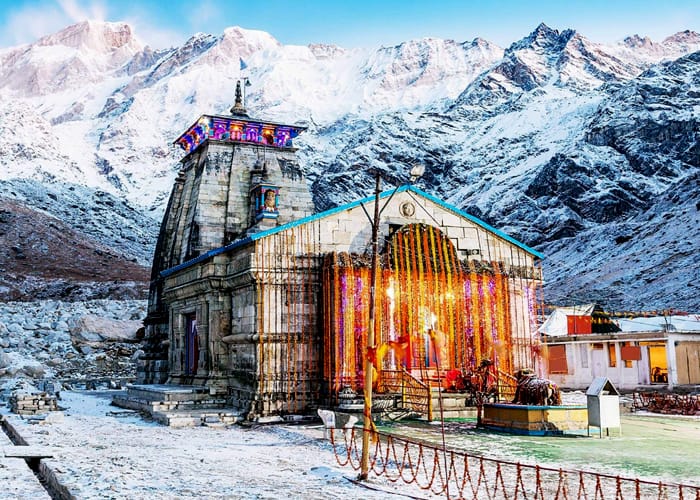
Located in the lush valley of the Garhwal Himalayas, Kedarnath is an ancient Shiva temple. Important for being a part of the Chota Char Dham Yatra of Uttarakhand, the temple receives a heavy footfall of devotees during the yatra. It is also believed that Lord Shiva used to stay here with goddess Parvati before heading to Amarnath cave. The foundation was laid by the Pandavas brothers. It was later on revived by the 8th-century propagator of Advaita Vedanta, Adi Shankaracharya. The presiding deity is worshipped in the form of a triangular rock. The temple is located on the banks of the holy Mandakini River and against the stunning backdrop of the Kedar dome range of Mountains.
Click Here to Enquiry for Chardham Yatra by Helicopter
2. Shri Amarnath Cave Temple (Jammu and Kashmir)
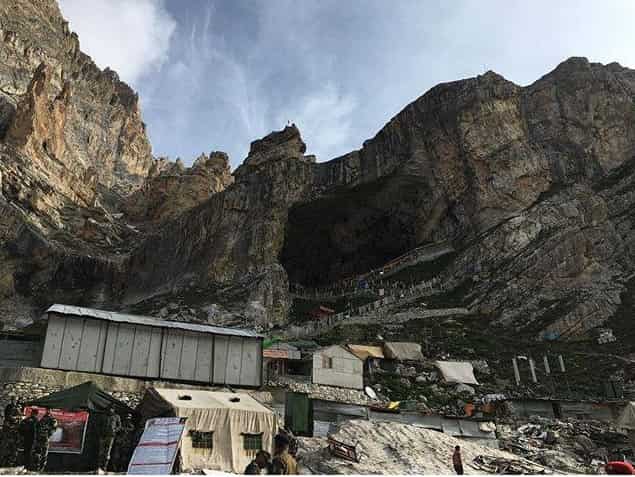
The cave temple of Amarnath is unique in every sense. Located in the remote location of Jammu Kashmir, this cave temple is the focal point for the Amarnath Yatra. Each year scores of Devotees mek the gruelling and challenging pilgrimage to offer their prayer to Lord Shiva. This pilgrimage is a testament to the pure devotion of the pilgrims. The route is a high-altitude challenging way that tests the emotional and physical boundaries of every devotee. The shrine represents an important part of Hinduism. This is because it was here that the Lord had revealed the secret of immortality to his consort Goddess Parvati.
3. Lingaraj Temple (Odisha)
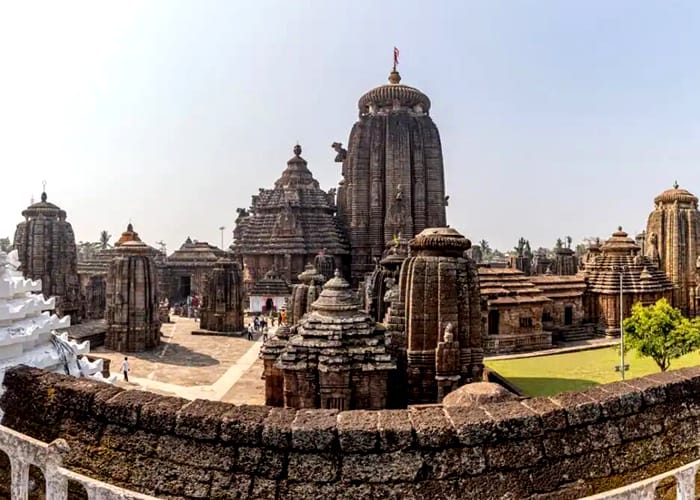
Dedicated to the Harihara incarnation of Lord Shiva, the Lingaraja Temple is known for its impressive Kalinga Style of architecture. This temple is a must visit for everyone. Constructed by the Somavamsi Dynasty rulers, the temple complex is large and very well done. It is also one of the must visit places in Bhubaneshwar. The temple is named after the lingam form of Lord Shiva. A part of the temple was built during the 6th century and later on completed to its present form by the last decade of the 11th century. Made up of laterite and sandstone that gives the temple its classic red hue, the temple is a must visit for every Shiva devotee.
4. Shore Temple (Tamil Nadu)
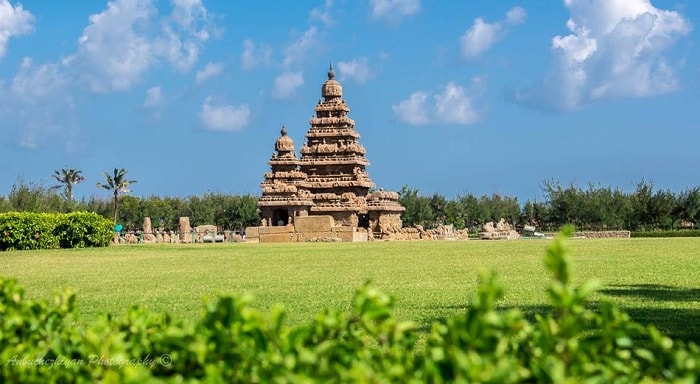
Overlooking the Bay of Bengal the shore temple of Mahabalipuram was built from 700-728 AD. The unmatched architectural beauty of the temple has stood the test of time. As a part of one of the groups of monuments at Mahabalipuram, it has been included in the UNESCO world heritage site. During ancient times, the shore temple used to act as a landmark for the Mahabalipuram port to the trading ships. The two main temples here are dedicated to Lord Shiva while one small temple in the complex is dedicated to Lord Vishnu.
5. Baba Baidyanath Temple (Jharkhand)
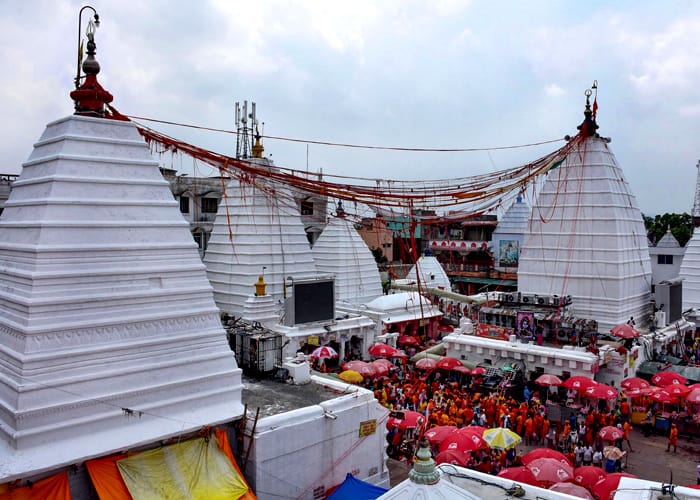
Located in Deoghar, as the name suggests, the temple is dedicated to the Lord of medicine. It is derived from the Hindu term ‘Vaidya’ and ‘Nath’. The humble-looking, stunning white temple is also a part of the 12 Jyotirlinga. As per Hindu legends, it’s believed that the demon king Ravana, used to perform his meditation and puja rituals at the current temple site, to please Lord Shiva and gain his boons. This temple also springs to life during the annual Kanwar yatra where the devotees or Kanwarias, offer Gangaajal to Lord Shiva here.
6. Trimbakeshwar Temple (Maharashtra)
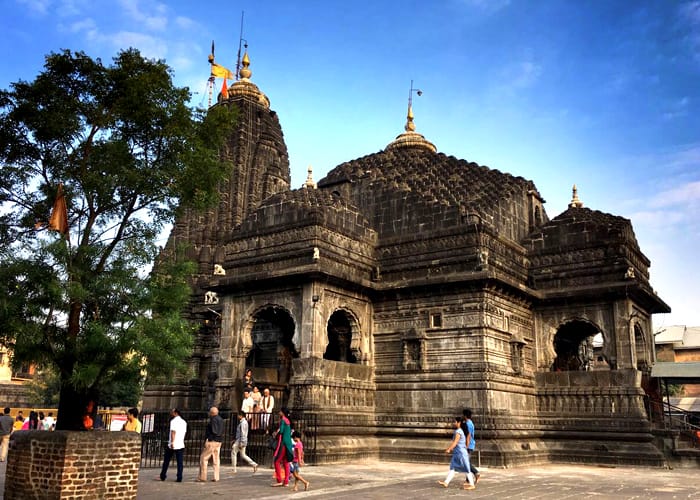
Dedicated to Lord Shiva and famous as one of the 12 Jyotirlinga temples. It is located on the origin point of the holy Godavari River and the current temple is recorded to have been built by Peshwa Balaji Bajirao. The temple houses 3 lingas dedicated to Brahma, Vishnu, and Mahesh. These 3 lingas are adorned with various precious gems and expensive metals like gold. Situated 28kms away from Nashik, the temple is built in a traditional Hemadpanthi style of architecture. Made entirely of black stone, its appealing architecture and impressive sculptures adds beauty to the foothills of Brahmagiri.
7. Mahakaleshwar Temple (Madhya Pradesh)
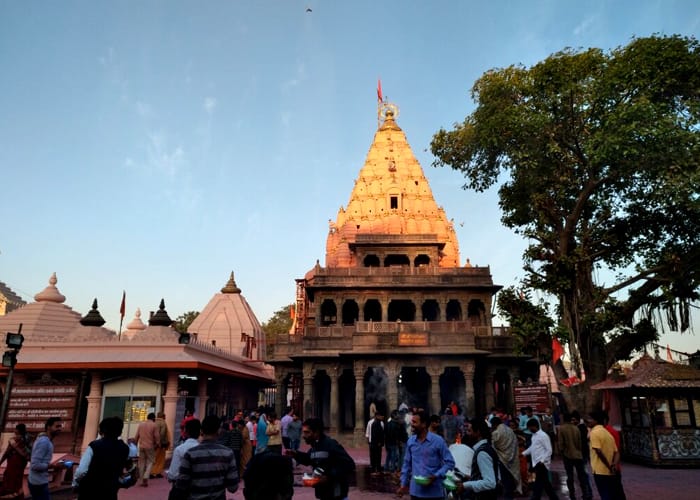
Mahakaleshwar Temple is a Hindu Shiva temple and is considered to be one of the most sacred of all Shiva adobes in the world. Located in the ancient city of Ujjain, the temple graces the banks of the holy river Shipra. The presiding deity is worshipped in the form of a Swayambhu which means that its been formed on its own. For this reason this Shiva temple is also a part of the 12 Jyotirlinga Tour. Mahakaleshwar is also a very important and powerful Shakti Peeth. This is a must see place among Shiva devotees as well as people spending their holiday in Ujjain.
8. Somnath Temple (Gujarat)
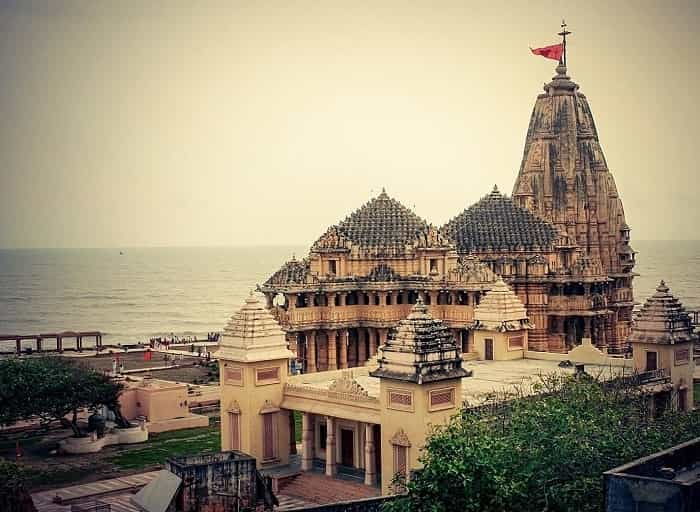
Gujarat is known for its delicious food, humble people, rich history, and iconic temples. Somnath Mahadev Temple has to be one of the top places of Shiva worship. This Jyotirlinga is situated in Prabhas Patan and is a very sacred pilgrimage site for Hindus. The Arabian sea waves crashing against the temple boundary walls are a sight to behold. Constructed in a typical Hindu temple architecture style, Somnath’s history is dynamic. It has been constructed, destroyed, and reconstructed over 15 times. The foundation of the temple was laid between the 1st millennia to 9th century. The temple complex also consists of a museum and a sound and light show that takes place every evening.
Click Here to Enquiry for Dwarka Somnath Trip Plan
9. Tarakeshwar Temple (West Bengal)
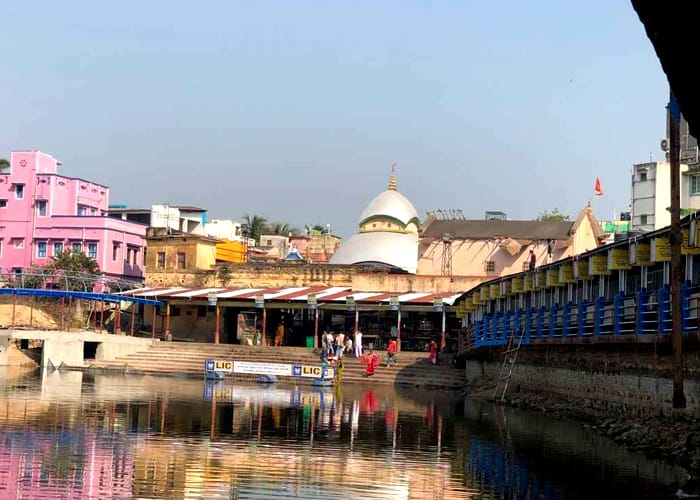
Located in West Bengal Taraknath temple is a major pilgrimage center for Lord Shiva in the state. The temple graces a small part of the holy Hooghly River. Its traditional Bangla style of architecture makes it a very unique Shiva temple. The temple also houses a small water thank. People say taking a dip in it would please the Lord and he will grant the devotee with whatever their heart desires. The presiding deity is a violent or the Ugra form of Lord Shiva who drank the poison or wish that had come up during Samudra Manthan. The linga worshipped in the temple was discovered in the nearby Tarakeshwar region.
10. Kashi Vishwanath Temple (Uttar Pradesh)
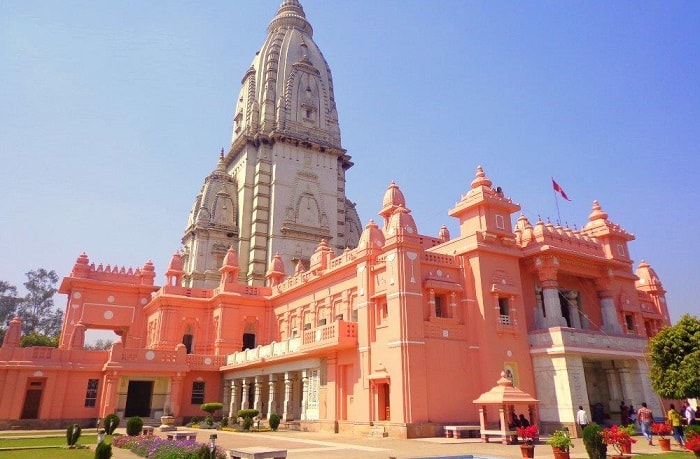
When it comes to iconic, the ancient Shiva Temple, Kashi Vishwanath Mandir deserves a special mention. Situated in Devbhoomi Varanasi, the temple stands on the western bank of the holy Ganga River. The temple is an integral part of Shiva worship and pilgrimage. The lord is worshipped in the form of Vishwanath Ji which means the lord of the universe. The temple has been through a long history of demolition by the Mughal emperors. However, the temple always got made with the current structure being built by Ahilyabai Holkar of Indore in 1780. Other than its rich historical value the defining feature of the temple is its 16-meter high gold spire and a pure gold dome donated by Maharaja Ranjit Singh. The temple has also been graced by the esteemed presence of notable saints like Adi Shankaracharya, Ramakrishna Paramahamsa, Swami Vivekananda, and many more.
11. Omkareshwar Temple (Madhya Pradesh)
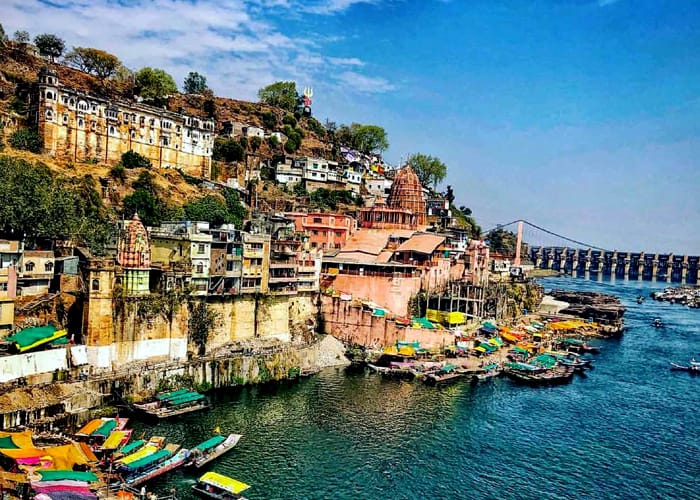
Dedicated to the Hindu Lord Shiva, in Khandwa Madhya Pradesh, this temple is one of the 12 most highly revered Jyotirlinga in India. As the name suggests, the temple is dedicated to the Omkar form of Shiva which means lord of the ‘Om’ sound. The temple is on an island called Mandhata which is a holy island and is supposed to be in the shape of the ‘Om’ symbol. The puja rituals here are highly elaborate. The deity is worshipped thrice a day by 3 different priests. The presiding idol of the lord is presented in the form of a 3 headed lingam which has its own mythical importance. According to legends, lord shiva is said to have appeared in front of Vindya (the lord who controls the Vindhyachal mountain range) after being pleased with his worship.
12. Mallikarjuna Swamy Temple (Andhra Pradesh)
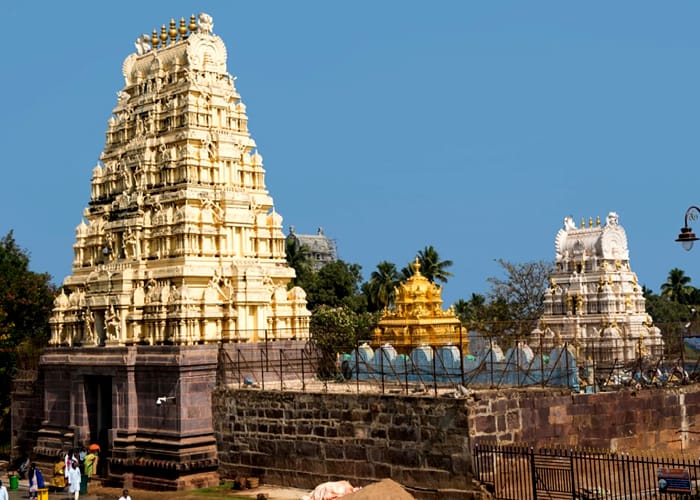
Located in the holy town of Srisailam, and yet another part of the holy Jyotirlinga pilgrimage, this temple is a stunning work of art. Built-in a traditional South Indian style of architecture and topped off with a dazzling pure gold roof, the temple is one of a kind. Here, goddess Parvati is worshipped as Mallika while Shiva is worshipped as Arjuna. It is said that just a Darshan of the lord at this temple will grant the devotees moksha. Being located right next to a river has its perks. Every day the presiding lingam of Lord Shiva is bathed with its water.
13. Brihadeshwara Temple (Tamil Nadu)
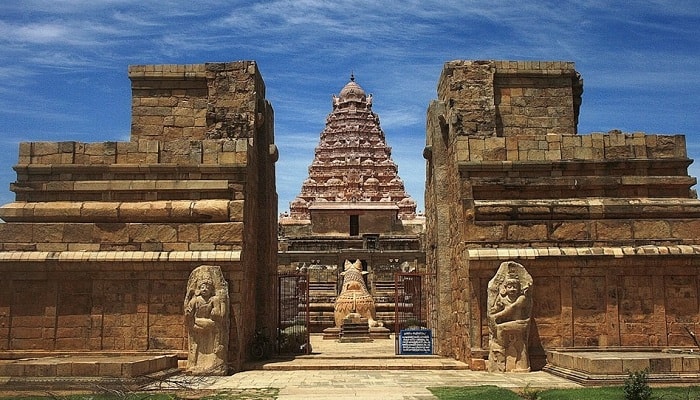
Located on the right bank of the holy Kaveri River, Brihadeshwara Temple is one of the largest Hindu temples in the world. The Tamil architecture utilized in its creation is an exemplary example of exquisite design. The temple, dedicated to Lord Shiva, was built by the Chola emperor Rajaraja 1. It is a part of the UNESCO world heritage site as a part of the great living Chola temples. The term Brihadeshwara dissects into the meaning ‘great lord big Shiva’ temple. The main temple is built entirely in granite with a massive 200 feet tall Vimana marking the south gate. The Chola king got inspired to get this temple constructed while dreaming one night during his trip to Sri Lanka.
14. Tungnath Mahadev Temple (Uttarakhand)
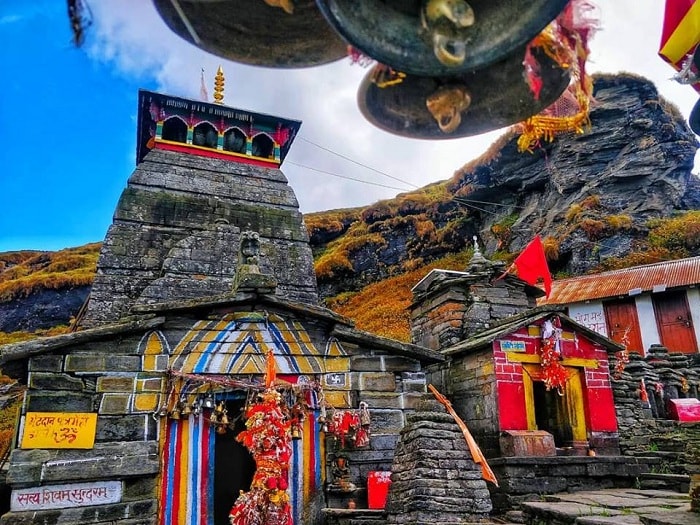
Tungnath Mahadev is famous the world over as the highest Shiva Temple. Located in the upper reaches of the Garhwal Himalayas, the temple holds a lot of importance. The term Tungnath literally translates into ‘Lord of the Peaks’. Surrounded by serene mountain beauty, the temple looks eerily similar to Kedarnath. The foundation for this temple was laid by the Pandavas brothers while they were out looking for Lord Shiva. The temple is reached after covering a rather easy hike of just a couple of kms. Walking just 1 km further from the temple site will open up Chandrashila top. The top offers mind-blowing views of the surrounding snow-clad mountain ranges that will amp up the spiritual vibes. The temple can be easily visited by family and people who love adventure.
15. Da Parbatia Temple (Assam)
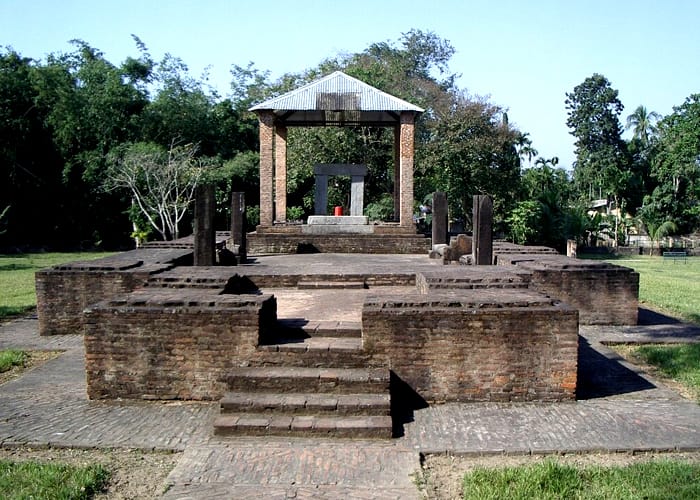
Located in a small village just a couple of kms away from Tezpur, Da Parbatia is one of the oldest Hindu temples in Assam. Built during the 5th – 6th century, the temple is now categorized as a protective site under the archaeological survey of India. The temple is said to have been buried under rubble and bricks as a result of a violent earthquake. Later on, by the 1980s, the temple was properly excavated. It revealed that the temple contained several marvelous works of art. The intricate carvings and fine engravings on the temple walls and doorway represent the rich history India is home to.
16. Murudeshwar Temple (Karnataka)
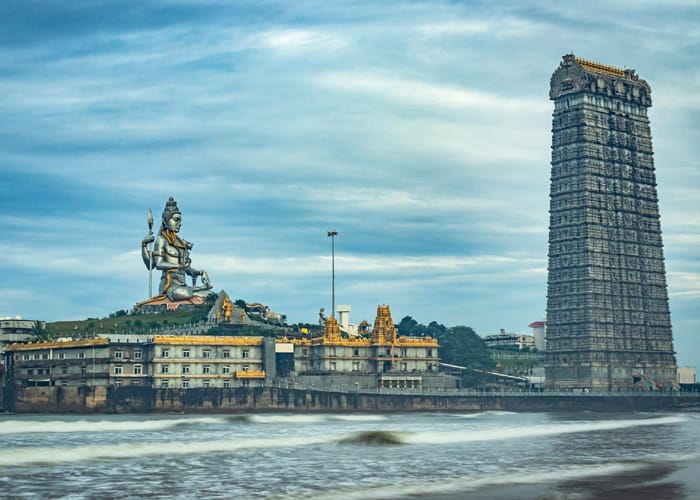
Murudeshwar is one of those Shiva temples that will take your breath away in one glance. Sitting peacefully next to the roaring river is a magnificent Shiva statue in a yogi position. This statue is famous for being the 2nd largest Shiva statue in the world. The temple is located in the sacred Kanduka hills which are surrounded on 3 sides by the Arabian Sea. The entire temple surface is decorated with intricate and detailed carvings. Although the temple compound has been modernized the sanctum of the temple is made in traditional style. The legend of this temple revolves around demon king Ravana and his experience with Lord Shiva appearing in front of him.
17. Vadakkunnathan Temple (Kerala)
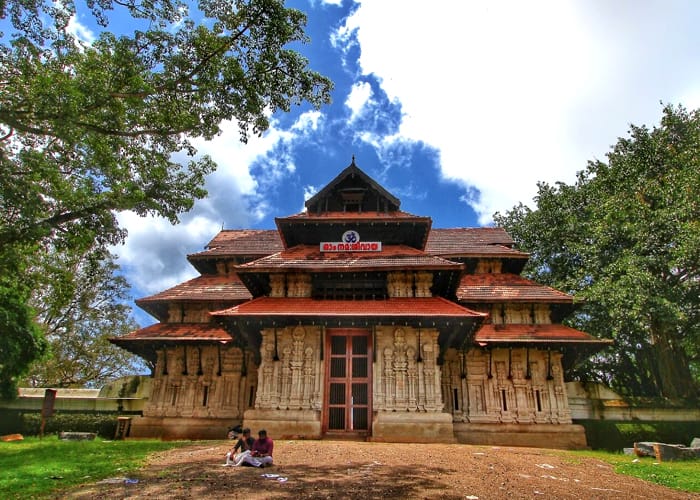
This ancient Hindu temple dedicated to Lord Shiva is located in Thrissur. The temple is known for its aesthetic values. Famous as one of the oldest temples in Kerala, Vadakkunnathan Temple is also included in the UNESCO world heritage site. The murals and paintings decorated on the walls of the temples are 400-1000 years old. Along with a Shiva shrine, a shrine dedicated to Lord Vishnu is also created inside the temple. The temple is situated on top of a small hillock and spread out over an area of 9 acres. Reflecting the art and culture of the heritage of Kerala, there is a small museum also located within the temple premises.
18. Ramanathaswamy Temple (Tamil Nadu)
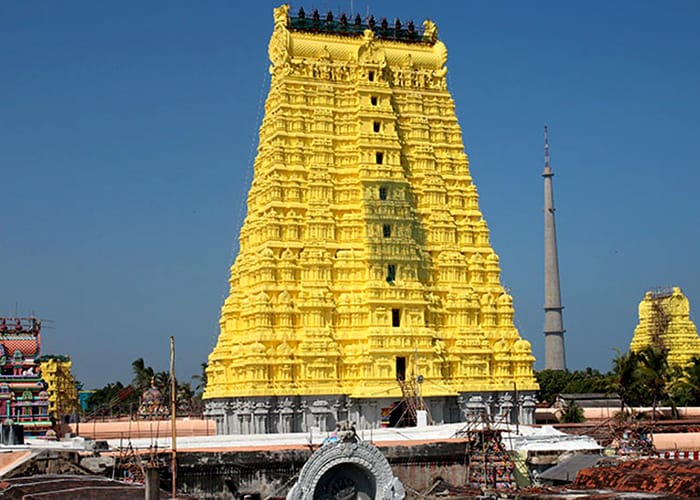
Situated on the spiritually evoking island of Rameshwaram, Ramanathaswamy temple is a majestic Shiva Temple. It is also a part of the holy Char Dham Yatra along with Badrinath, Dwarkadheesh, and Jagannath Temple. The temple is extremely holy when it comes to its relevance. The temple foundation and the Shivling were established by Lord Ram himself. He created the temple here as a place of Shiva worship before heading for war against Ravana in Sri Lanka. The temple is exquisite in every sense. From the grand exteriors to the incredibly mind-boggling interior design. Every pillar and wall is intricately carved with elaborate designs and colorful paint that enhances the unmatched beauty of the entire surroundings.
19. Baba Bhootnath Mandir (Himachal Pradesh)
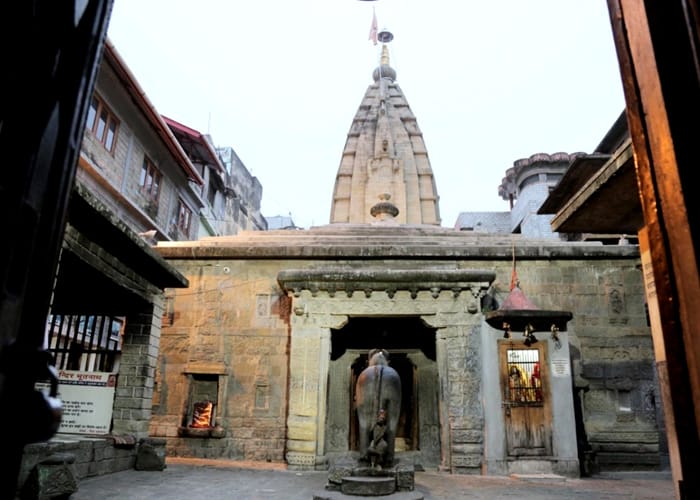
Bhootnath temple was built by Raja Ajber Sen during the 15th century in the heart of Himachal in Mandi. As per folklore, Lord Shiva had appeared in the king’s dream and directed him to extricate a Shivling that was buried on the site. The king did just that and got a temple constructed to mar the holy site. Ever since then Bhootnath temple became the central point for Shivratri Festival. The temple is also a famous site for going on trekking, hiking, and other such outdoor adventure activities. Looking to add a hint of spirituality in your adventure holiday in Himachal? A visit to this temple is just the thing you need.
20. Chidambaram Nataraja Temple (Tamil Nadu)
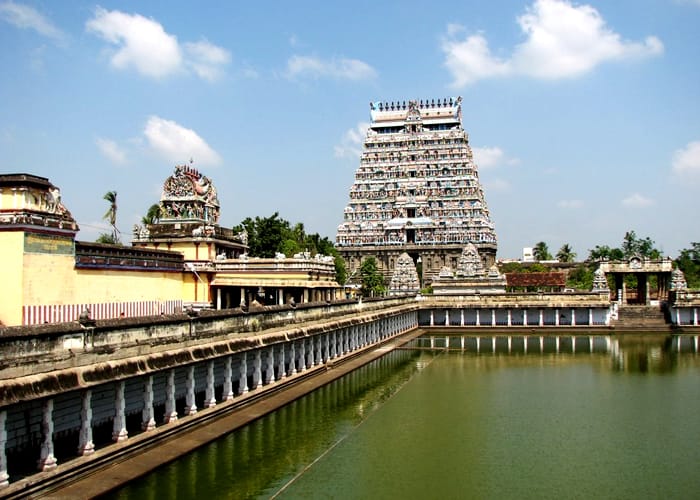
The Chidambaram Nataraja Temple is a towering, stunning Shiva Temple. Dedicated to the dancing form of Lord Shiva known as Nataraja, the temple is a huge structure that is decorated with elaborate works of art. The temple is one of the 5 elemental lingas according to the Shaivism pilgrimage tradition. It is also considered to be the subtlest of all the Shiva Temples or Kovils in Hinduism. Built during the 10th century, this temple is one of the oldest surviving active temples in South India. The main Gopura of the temple is so huge that it can easily be spotted from miles away. This temple is truly a great representation of the amazing artistic culture and architecture that thrived in that region during that era.
Shiva temples in India are a combination of untouched spirituality, awe-inspiring history, and interesting legends. No matter what the reason for your visit to any Shiva temple is, the devotees leave with a new found sense of rejuvenation.
Frequently Asked Questions (FAQs)
Which Is The Most Powerful Shiva Temple?
In its own way, every Shiva temple is powerful. Currently, the towering sculpture of Murudeshwar Temple in Karnataka is gathering worldwide attention.
How Many Shiva Temples Are There In India?
There are 108 Shiva temples in India. However, if we add up the local temples and other holy shrines, the number can go up to thousands.
Where Is The Biggest Shiva Temple In India?
Somnath Jyotirlinga in Gujarat is the biggest Shiva temple in India.
Is Tungnath Higher Than Kedarnath?
Yes. Tungnath is higher than Kedarnath by a couple of feet.
Which Is The First Shiva Temple In India?
The Nageshwar Jyotirling in Gujarat is considered to be the first Jyotirlinga among Shiva temples of India.





















 Call
Call WhatsApp
WhatsApp Enquiry
Enquiry